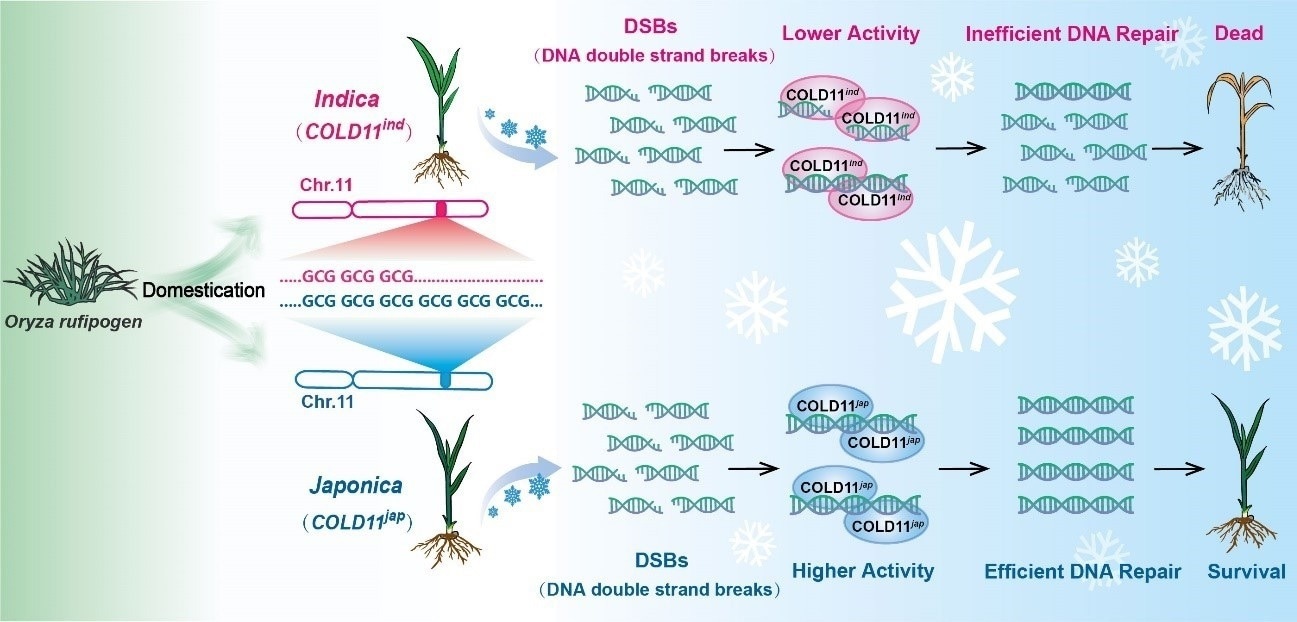A recent study performed by Professor Chong Kang’s group from the Institute of Botany of the Chinese Academy of Sciences (CAS) has disclosed a fact that a novel cold domesticated repair mechanism for DNA damage in rice.
 Schematic representation demonstrating domestication-selected COLD11 modules for repairing DNA double-strand break induced by chilling in rice. Image Credit: Professor CHONG Kang’s group
Schematic representation demonstrating domestication-selected COLD11 modules for repairing DNA double-strand break induced by chilling in rice. Image Credit: Professor CHONG Kang’s group
This offers comparable elite modules for the enhancement of chilling tolerance trait in rice with the availability of codon repeats at a single site.
The study outcomes were reported online in the Science Advances journal.
Global climate change has resulted in a clear increase in abnormal environmental temperatures and extreme weather events in the past few years. Hence, it is immediate that crops have the potential to bear extreme temperatures to guarantee stable yields.
Even though plants have developed complex and sensitive protective mechanisms to survive chilling stress, DNA damage still happens, thus reducing the defenses of plants. Moreover, the basic regulatory mechanism has been not yet clearly understood.
In this study performed, Professor Chong’s group, in collaboration with Professor Qizhai Li’s group from the Academy of Mathematics and Systems Science of CAS, and Professor Zhukuan Cheng’s group from the Institute of Genetics and Developmental Biology of CAS, utilized a method integrating population genomics, genetics, and cell and evolutionary biology to utilize the novel module for chilling tolerance.
Depending on multidimensional scaling, the scientists executed data-merging genome-wide association studies (DM-GWAS). A series of loci were determined by GWAS utilizing merged phenotypic data. One such was qCTS11-1 on chromosome 11, which makes an evident contribution to rice chilling tolerance.
As per the scientists, its major gene, COLD11, was determined with fine-scale mapping. Loss-of-function mutations of COLD11 caused decreased chilling tolerance.
Various types of GCG codon duplicate encoding alanine in the first exon of COLD11 were noted for chilling-sensitive indica varieties and chilling-tolerant japonica varieties. The GCG codon repeat numbers had an obvious and positive correlation with chilling tolerance.
Besides, genome evolution analysis of representative rice germplasms indicated that several GCG sequence repeats were subjected to powerful domestication selection at the time of the northern expansion of rice planting.
Moreover, COLD11 encodes a DNA repair protein that plays a crucial role in the repair of DNA double-strand breaks. The GCG repeat numbers in its first exon displayed a positive correlation with its biochemical activity. This is the first report of a domestication-selected DNA damage repair mechanism and its equivalent elite modules including chilling stress.
Utilizing DM-GWAS of japonica and indica—two rice subspecies with considerable divergence in chilling tolerance—this study discloses that COLD11 is a significant quantitative trait loci gene used for chilling tolerance.
The breakthrough of the key codon repeats in the first exon of COLD11 was verified by phylogenetic and geographic distribution analysis. This sets the stage for fine regulation of rice chilling tolerance with the availability of a single site. It is a possibly beneficial molecular module for enhancing the chilling tolerance trait in rice across the molecular design.
Source:
Journal reference:
Li, Z., et al. (2023) Natural variation of codon repeats in COLD11 endows rice with chilling resilience. Science Advances. doi.org//10.1126/sciadv.abq5506